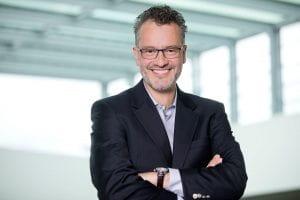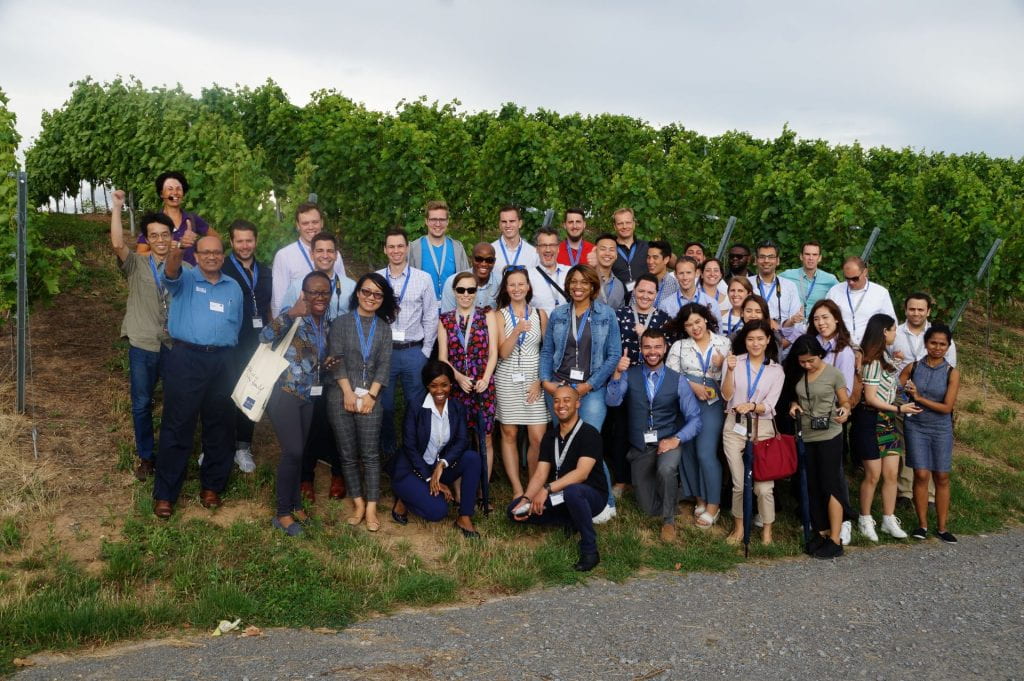 Markus Vodosek is a clinical associate professor in Management and Entrepreneurship who joined Kelley in the Fall of 2019. He teaches Navigating the Global Business Environment, a new elective on managing in an era where success means balancing globalization with de-globalization.
Markus Vodosek is a clinical associate professor in Management and Entrepreneurship who joined Kelley in the Fall of 2019. He teaches Navigating the Global Business Environment, a new elective on managing in an era where success means balancing globalization with de-globalization.
What is the most rewarding aspect of your job?
Without question, the most rewarding aspect of my job is when students tell me how the concepts and cases they encountered in my courses have helped them make a difference in their jobs. For example, a student mentioned to me recently that our discussion of an EU requirement for all textile products to be content-labeled in every language of the EU countries where the product is sold helped her small company save a bunch of money. Because of our discussion her company labeled its products correctly from the get-go.
What can students expect from your Kelley Direct entrepreneurship courses online?
I am eager for students to gain the knowledge and skills they need to advance in their careers. In my courses, we achieve this objective through a combination of guided self-study, video lectures, analysis and discussion of business cases, and individual reflections on how the topics of a given course relate to the company students currently work for.
I often introduce current events for class discussion. For example, in November 2020, 15 countries in the Asia-Pacific that account for one-third of the world’s population and economic output signed a regional trade agreement, the Regional Comprehensive Economic Partnership (RCEP). In class, we might discuss the opportunities and threats RCEP presents for the companies students work for in terms of exports, imports, and foreign direct investment.
How has COVID pushed you to teach about the global business environment in new ways?
The COVID pandemic has had a catalytic effect on both the content and the pedagogy of my teaching. It has provided a treasure trove of examples for why knowledge about the global business environment matters. For one, there are the intricacies of global supply chains and the influence of governments on trade and foreign direct investment. As I am writing this blog entry, the Italian government has just restricted the export of 250,000 doses of the AstraZeneca COVID vaccine to Australia. The Swedish-British company had produced the vaccine in an Italian plant, and Italy and the EU maintain that AstraZeneca had not delivered the number of doses to the EU that it had contractually agreed to. COVID also revealed considerable cultural differences in the way countries have handled the pandemic, including how they managed the opening and closing of their businesses.
In terms of pedagogy, my colleagues and I had to come up with additional ways to get students to interact in meaningful ways in an online format. Before COVID, Kelley Direct classes were typically the only major online events in students’ lives. With COVID, many other meetings were suddenly online, and soon Zoom-fatigue set in. We had to respond by making the online experience more varied. For example, COVID sparked our adoption of new collaboration apps such as MURAL and the conversion of experiential exercises originally designed for the physical classroom to an online format.
How do you find work-life balance? What do you tell your students how best to manage their time to be successful?
The work-life balance question assumes that work and life are separate. I don’t quite buy this distinction. What I am striving for is more work-life integration. Some of the best ideas for my teaching I’ve gotten while chatting with friends and strangers on the chair lift in Utah’s ski resorts or while practicing my violin. I often vet teaching or writing ideas with my wife. My daughter and I frequently compare her learning experience at the University of Tübingen in Germany with the learning environment at Kelley.
In terms of time management, here is what I found to work for most students: Listen to your passions and let these passions guide how you spend most of your time. For the things you don’t like to do, feel indifferent about, or find hard, set aside time and deal with them in a disciplined and organized way.
How do you online classroom engagement for your students?
The online classroom offers many opportunities for students and instructors to engage with the course material and with each other. Online breakout rooms are an effective way for students to meet and discuss course topics, and for the instructor to stop by to observe and facilitate the discussion. Google Sheets, Google Docs, Google Slides, and MURAL boards are excellent tools for collecting and consolidating ideas in the breakout rooms and for creating talking points for ad hoc group presentations. They also allow instructors to monitor what the group is working on and intervene if the discussion goes off track or needs additional input. The chatbox and polls in Zoom or apps such as Poll Everywhere or Mentimeter enable the instructor to easily gather and aggregate student input and take the pulse of the classroom. Furthermore, the screen-sharing tool in Zoom makes it easy for students and instructors to focus everyone’s attention on a single document. With all these options, it is possible to keep students engaged. I typically lead us to a new “pasture” every 20 minutes.
What do you tell your students if/when they ask about accelerating their career?
I tell students to leverage their Kelley experience by building their social networks. Since every Kelley Direct student has an interesting bio and considerable job experience, students should start with the other students they meet in the online classroom and in breakout rooms. Looking for other online and offline opportunities to meet others who are dissimilar to themselves is the next step. This will increase students’ access to information and other resources they don’t already have. Joining student clubs and professional associations should be on students’ to-do lists as well. So should internships and informal interviews with managers who work in an area students want to work in after they graduate. Social networks, however, are only as good as the knowledge, skills, and resources of their members. Having something to offer and contribute to the network is crucial as well.
What is something people may not understand about online classroom engagement?
To a large degree, online learning is a social activity and requires time commitment and proactive engagement with fellow students and professors. Online learning is neither a simple knowledge download nor a form of entertainment. Instead, it is a give-and-take among all participants in the learning process.
What are you most excited about in the new Jellison studios?
I can’t wait to use the Jellison studios. Zoom and collaboration tools like Google Sheets and MURAL have served us quite well. However, they feel like a makeshift operation compared to the integrated learning and presentation environment of the Jellison studios.
 What is something most people don’t know about you?
What is something most people don’t know about you?
There is a ski run at the Brighton ski resort in Utah called “Simon’s Way.” It is named in memory of my son who passed away in 2004 from neuroblastoma, a rare childhood cancer. The boyfriend of a student in my class at the University of Utah was in charge of the ski school at Brighton and was able to convince the powers that be to name the run after Simon. This is another example of the integration of work and life (see above)… By the way, I’m still looking for other naming opportunities. So if anyone knows of things waiting to be named, let me know!
Your book recommendation for MBAs?
Here are a couple of my favorite books MBAs will benefit from. Atul Gawande’s The Checklist Manifesto (2009) makes a simple point: no matter how skilled people are, good checklists make for better outcomes. Gawande shows how diverse fields, such as hospitals, airlines, and businesses have benefitted from checklists. They help reduce complexity, avoid assumptions, focus attention, and bring out unshared information in groups. Gawande is a surgeon, public health expert, social entrepreneur, and staff writer for The New Yorker. The other good read is Bülent Eczacıbaşı’s 2020 book A Rip in the Sea. It’s another manifesto, this time for business as a vehicle for the economic and cultural welfare of society. Eczacıbaşı is one of Turkey’s most esteemed executives. In an alluring mix of memoir, history lessons, and social science musings he describes the development of the world’s 13th largest economy and brings to life international business concepts such as Turkey’s import substitution policy from the 1930s to the 1980s which led to large family holdings like his own, producing anything from ceramic tiles to toilet paper and biopharmaceuticals.
